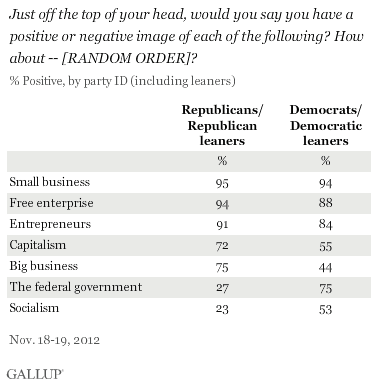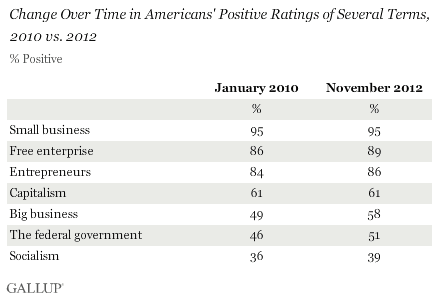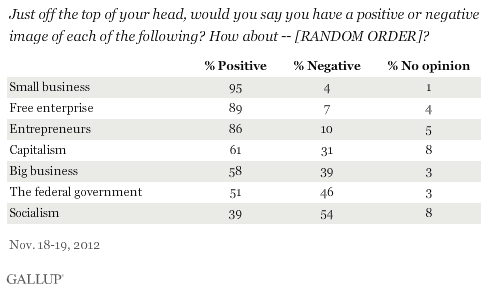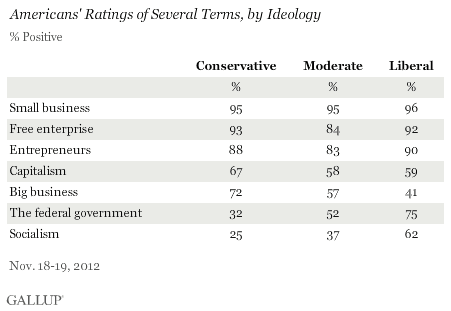PRINCETON, NJ -- Exemplifying a major partisan divide in modern politics, Democrats react significantly more positively to the term "federal government" than they do to the term "capitalism," while the opposite is true for Republicans. But both Democrats and Republicans are highly positive about the terms "small business," "free enterprise," and "entrepreneurs."

These findings are based on a Nov. 18-19 update of a January 2010 Gallup poll question asking respondents if they had a positive or negative image of each of seven economically related terms.
Republicans and Republican-leaning independents and Democrats and Democratic leaners also differ in how they react to the terms "big business" and "socialism." Republicans are more positive about the former; Democrats are more positive about the latter.
The differences between Democrats and Republicans in how they view these terms provide an important window into today's political realities. Democrats have a more positive image of the federal government than they do of capitalism, by a 20-percentage-point margin, while Republicans are more positive about capitalism than the federal government, by a 45-point margin. This difference is not surprising -- particularly given that a Democrat currently occupies the White House -- but underscores the divergence in the ways in which Republicans and Democrats look at the appropriate role of the government in relationship to business.
Additionally, Democrats have roughly similar reactions to capitalism (55% positive) and socialism (53%), while Republicans are much more positive about the former than the latter, by 72% to 23%, respectively.
Americans Grow More Positive Toward Big Business and Federal Government
Americans' reaction to five of these terms has changed little since January 2010, despite a presidential election in which both candidates heavily debated the role of government. However, the images of big business and the federal government have improved. The change in the image of big business is largely the result of a jump among Republicans, from 54% in January 2010 to 75% now. And the change in the image of the federal government is because of an increase in positive ratings among Democrats, from 67% to 75%.

Overall, Americans today are most positive toward small business, free enterprise, and entrepreneurs. The reason for these highly positive overall ratings lies in the fact that there are only minor partisan differences between Republicans and Democrats, or between conservatives and liberals.
Americans give lower ratings to the other four terms measured in the survey, ranging from 61% who have a positive reaction to capitalism to 39% who have a positive reaction to socialism, reflecting the greater variation between Republicans and Democrats.

Liberal and Conservative Differences Mirror Party Divide
Americans' views of the seven terms differ according to ideology, mirroring the divergent ratings by party. Liberals are substantially more positive about the federal government and socialism than are conservatives, while conservatives are more positive about big business and capitalism. In fact, liberals -- about 20% of the sample -- are slightly more positive about socialism than capitalism.

Implications
These data reinforce the conclusion that certain terms in common use today in political and economic discourse are more politically charged than others. Any mention of capitalism, socialism, big business, or the federal government will evoke significantly different reactions from Republicans than from Democrats and from conservatives than from liberals. But, Americans across parties and ideologies are uniformly positive toward small business, free enterprise, and entrepreneurs.
Capitalism and free enterprise have many similarities theoretically. But, capitalism as a term gets a significantly more negative rating from Democrats -- and to a degree from Republicans -- than does free enterprise.
Small and big business are similar in concept as well, but while every group appears to love the former, the latter evokes less positive reactions, particularly among Democrats and liberals.
Practically, these data suggest that politicians seeking the most positive overall reaction from voters should choose to use the term "free enterprise" rather than "capitalism" in describing America's prevailing economic system and preface mentions of the word "business" with the adjective "small."
Survey Methods
Results for this Gallup poll are based on telephone interviews conducted Nov. 18-19, 2012, on the Gallup Daily tracking survey, with a random sample of 1,040 adults, aged 18 and older, living in all 50 U.S. states and the District of Columbia.
For results based on the total sample of national adults, one can say with 95% confidence that the maximum margin of sampling error is ±4 percentage points.
Interviews are conducted with respondents on landline telephones and cellular phones, with interviews conducted in Spanish for respondents who are primarily Spanish-speaking. Each sample includes a minimum quota of 400 cellphone respondents and 600 landline respondents per 1,000 national adults, with additional minimum quotas among landline respondents by region. Landline telephone numbers are chosen at random among listed telephone numbers. Cellphone numbers are selected using random-digit-dial methods. Landline respondents are chosen at random within each household on the basis of which member had the most recent birthday.
Samples are weighted by gender, age, race, Hispanic ethnicity, education, region, adults in the household, population density, and phone status (cellphone only/landline only/both, cellphone mostly, and having an unlisted landline number). Demographic weighting targets are based on the March 2011 Current Population Survey figures for the aged 18 and older population living in U.S. All reported margins of sampling error include the computed design effects for weighting.
In addition to sampling error, question wording and practical difficulties in conducting surveys can introduce error or bias into the findings of public opinion polls.
View methodology, full question results, and trend data.
For more details on Gallup's polling methodology, visit https://www.gallup.com/.
